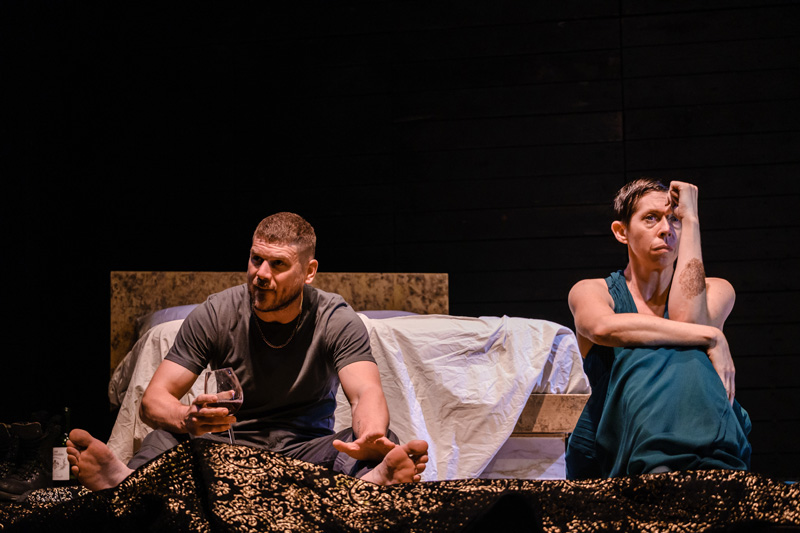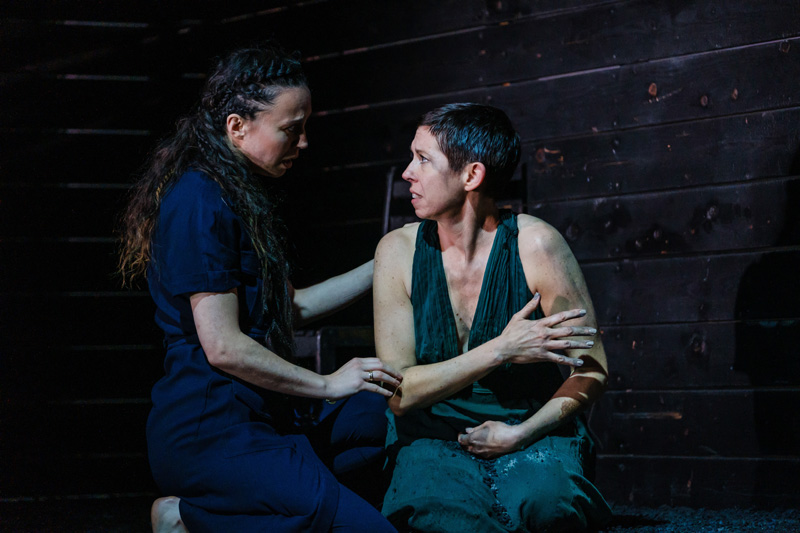“Girl on an Altar” – Kiln Theatre
Neil Dowden in north London
3 June 2022
Girl on an Altar is Irish playwright Marina Carr’s powerful new take on the first part of Aeschylus’ Oresteia trilogy. The drama shows how Clytemnestra murders her husband Agamemnon, general of the Greek armed forces, who had previously sacrificed their young daughter Iphigenia for the sake of their war against Troy. Carr focuses very much on Clytemnestra’s experiences and emotions. Indeed, there is a strong female perspective as the roles of Trojan captive Cassandra and servant Cilissa (who does not appear until the second play in Aeschylus’ trilogy) are enlarged to counteract the macho war-mongering in the original.

David Walmsley and Eileen Walsh. Photo credit: Peter Searle.
Clytemnestra relives the horror of finding out that (the unseen) Iphigenia has been brought to Aulis not to be married to Achilles – shocking enough as she is only ten – but to be killed in a ritual slaughter. The classical myth holds that Agamemnon is forced to do this to propitiate the gods who have becalmed the Greek fleet. But here Agamemnon is revealed to have no belief in the Oracle, and his claim to Clytemnestra that he has to allow the sacrifice to save the rest of the family rings false. It is all about a power struggle with Achilles, to prove that as leader he is a strong enough man to kill even his own daughter.
Ten years later – after the Greeks’ epic siege of Troy has finally proved successful – Agamemnon returns home (with the Trojan King Priam’s daughter Cassandra as spoils). Clytemnestra has been living with Aegisthus (Agamemnon’s cousin and rival for the throne, who are deadly enemies due to a long-standing family feud), with whom she has a daughter. While initially Agamemnon and Clytemnestra put on a public display of unity, their relationship is destroyed, as her feelings of grief turn into a burning desire for revenge.
Girl on an Altar is a persuasively modern account of the tragic tale told with punchy poetry. Employing an effective technique, Carr presents her characters as narrators sometimes as well as protagonists, with past merging with the present. It’s a starkly compelling deep dive into the dark side of the human psyche. Carr has often explored Greek tragedy and myth in her work before, in her version of Euripides’ Hecuba for the RSC, and in plays like By the Bog of Cats (inspired by Medea) and Phaedra Backwards; indeed Ariel is loosely based on the Oresteia. Sometimes she sets the ancient classical stories within a contemporary Irish culture, but here the story is re-told in a more general way.

Kate Stanley Brennan and Eileen Walsh. Photo credit: Peter Searle.
Annabelle Comyn’s tight production maintains the tension throughout, climaxing in a blood bath that is effectively evoked through the throwing of red wine. Tom Piper’s striking design has a double bed centre stage on a rocky outcrop with sliding back doors revealing a harem or prison, while Will Duke’s video projections flood the stage with waves. Amy Mae’s atmospheric lighting and Philip Stewart’s brooding sound add much to the portentous mood.
Eileen Walsh gives an impressively committed performance as the passionate Clytemnestra, whose sexual love for her husband is overwhelmed by her anguish at his betrayal of their daughter. There is genuine electricity between her and David Walmsley’s ego-driven, forceful Agamemnon whose guilt is subsumed in warrior pride. Nina Bowers is touching as the traumatized Cassandra haunted by the sack of Troy and Kate Stanley-Brennan is the choric Amazonian freed slave Cilissa. Daon Broni plays the coolly opportunistic Aegisthus, while the protective concern that Jim Findley’s Tyndareus shows as the father of Clytemnestra offers an alternative to the toxic masculinity that has led to the tragedy.









